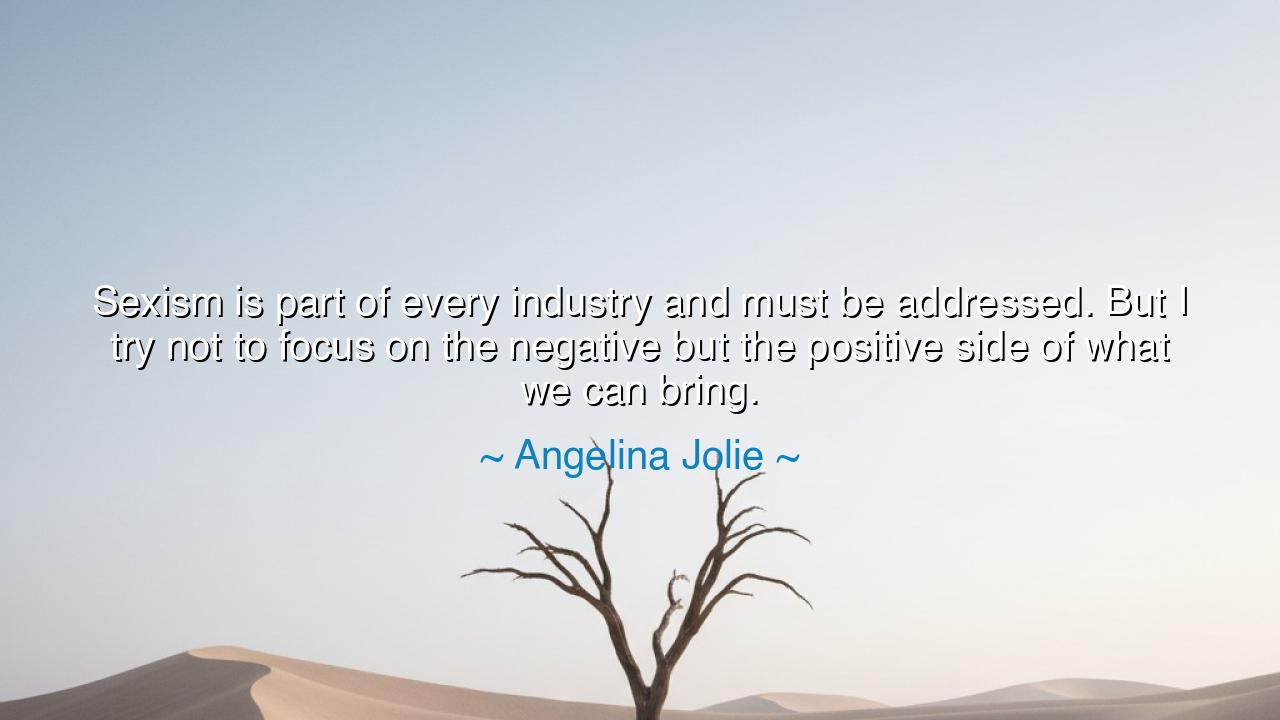
Sexism is part of every industry and must be addressed. But I
Sexism is part of every industry and must be addressed. But I try not to focus on the negative but the positive side of what we can bring.






When Angelina Jolie declared, “Sexism is part of every industry and must be addressed. But I try not to focus on the negative but the positive side of what we can bring,” she was not speaking only of her own life, but of the eternal struggle between oppression and renewal. Her words remind us that while injustice exists as a shadow in all corners of the human world, we must not be consumed by the shadow itself. Instead, we must look toward the light, toward what can be created, toward the positive power that springs from resilience, unity, and vision.
The ancients, too, knew this truth. When Sappho of Lesbos sang her verses, she lived in a time where the voices of women were often silenced or dismissed. Yet she did not dwell solely on the weight of restriction; instead, she gave the world poetry radiant with beauty, desire, and humanity. In this way, she transformed oppression into art, and limitation into timeless power. Like Jolie, she understood that to focus on what one can bring positively into the world is a form of defiance far greater than bitterness alone.
History offers further testimony. Consider Emmeline Pankhurst and the suffragettes, who lived under the heavy yoke of sexism that denied women the right to vote. They saw the negative, but their focus was not despair — it was action. They rallied, they protested, they endured imprisonment, and they sacrificed comfort for justice. Their victory came not because they obsessed over the cruelty of their chains, but because they fixed their eyes on the positive vision of freedom and equality for women yet unborn. In their courage, we see Jolie’s truth made manifest.
Her words also remind us that to address sexism does not mean ignoring it. A problem must be named, for silence is surrender. But once named, one must decide how to respond: either with a spirit trapped by anger, or with a spirit lifted by creation. To choose the positive is not weakness, but strength, for it requires imagination, hope, and the will to see beyond what is into what could be. It is to transform the wound into wisdom and the barrier into a doorway.
The heart of Jolie’s teaching is the choice of focus. To dwell only on the negative is to feed it, to let it rule our minds. But to nurture the positive side of what we can bring is to reclaim agency, to rise above victimhood, and to inspire others. This shift of vision does not erase injustice, but it gives the oppressed the power to reshape the narrative. The oppressor may impose limits, but only the spirit decides whether those limits define the soul.
The lesson is clear: acknowledge the wrong, but live for the greater right. Do not let the weight of injustice extinguish your flame; instead, let it make your fire burn brighter. When confronted by sexism or any form of oppression, act, create, and contribute in ways that affirm life and dignity. By doing so, you break the cycle of despair and replace it with the cycle of hope.
In practice, this means challenging sexism where you see it — in workplaces, in culture, in daily life — but doing so with a heart anchored in vision. Create opportunities, empower others, and speak words that uplift rather than only condemn. Protect the vulnerable, but also inspire them to see their own power. In this way, the positive influence grows stronger than the shadow of inequality.
Therefore, let us remember Angelina Jolie’s wisdom: sexism must be addressed, but the greater power lies in focusing on the positive side of what we can bring. Injustice may scar the world, but it cannot dictate the spirit of those who choose to rise. Live as one who sees the shadow yet walks toward the light, and you will not only endure — you will transform the world for those who come after you.






-ODinh Dao - official
I feel inspired by the focus on solutions and contribution, but it also raises questions about effectiveness. Can highlighting positive impacts alone drive systemic change, or must it be paired with confronting bias directly? I’d like to hear perspectives on how individuals and organizations can simultaneously celebrate achievements, foster inclusion, and address sexism in ways that are visible, measurable, and lasting.
TT24. Thanh Thuy
Reading this makes me think about leadership and influence. By emphasizing the positive contributions one can make, it seems to frame empowerment as proactive rather than reactive. But I question whether this approach could be misinterpreted as ignoring real challenges. How can advocates highlight their achievements and potential without minimizing the structural barriers that still exist in every industry?
BNBinh Nguyen
This statement makes me reflect on the role of mindset in addressing inequality. Does focusing on the positive actually motivate change more effectively than highlighting injustices, or could it inadvertently allow problems to persist? I’m curious how professionals across different sectors navigate this balance, and whether promoting the value they bring can genuinely shift organizational culture and opportunities for underrepresented groups.
KNKhanh Nguyen
I find this perspective both inspiring and challenging. Focusing on solutions rather than the pervasive issue of sexism seems empowering, but I wonder if downplaying the negative might risk underestimating the systemic problems that need urgent attention. How can individuals maintain optimism while still holding industries accountable for inequities? I’d like to explore strategies that balance positive action with meaningful advocacy against sexism.